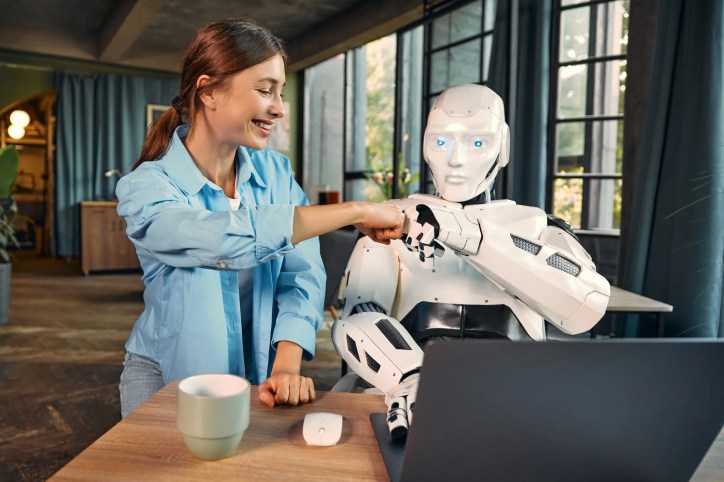Artificial intelligence (AI) is predicted to affect almost 40% of jobs around the world, replacing some and complementing others. Consequently, we need a careful balance of guidelines and regulations to tap into its potential for efficiency as well as new job opportunities. International standards for AI, such as ISO/IEC 42001, ISO/IEC 23053, and ISO/IEC 23894, provide consistent guidelines to assure the ethical and responsible use of AI in business.
How Is AI Impacting Jobs?
While AI is creating new job opportunities in sectors like AI development and data analytics, it is also leading to job displacement, particularly in industries that rely heavily on routine and repetitive tasks. Essentially, the rise of AI-powered tools threatens to automate as many roles as it creates, particularly for white collar, entry-level roles. In the most extreme cases, some of these jobs once performed by humans may disappear. Jobs at the highest risk include data entry, administrative roles, and graphic design.
46% of office and administrative support tasks, such as office staff, production workers, and customer service representatives, are considered the most vulnerable to automation. As stated by Goldman Sachs, 25% of routine tasks can already be robotized, and some studies predict that 300 million jobs could be lost or degraded globally by 2030.
The World Economic Forum finds that 170 million new jobs will be created by 2030—but 92 million will disappear, with the biggest growth in AI, tech, healthcare, green energy, and skilled trades. Technology, overall, is projected to be the most disruptive force in the labor market, with trends in AI and information processing technology expected to create 11 million jobs (while simultaneously displacing 9 million others). Hence, to stay competitive in this current job market, it may be helpful to build AI literacy and technological skills.
In sum, due to AI, we are on the brink of a technological revolution that could jumpstart productivity, boost global growth, and raise incomes around the world, but on the other hand, AI could also replace jobs and deepen inequality.
How Is AI Expected to Impact the Workforce?
According to research released by the International Data Corporation (IDC), introducing AI in business setups will result in $19.9 trillion being pumped into the economy by 2030 while contributing up to 3.5% towards global GDP by 2030. Another study done by McKinsey found that 70% of surveyed firms will be using some type of AI technology by 2030. These studies show that AI will have a tremendous influence on the global workforce in terms economic growth and technological innovation.
Integrating AI in the Workforce
An AI-driven future is underway. Embracing this evolution will be very important to secure a workforce with stability, relevance, and success. Standards for AI provide a consistent framework to guide organizations in responsibly and ethically using AI. By adhering to standards such as ISO/IEC 42001, ISO/IEC 23053, and ISO/IEC 23894, organizations can assure that their AI management systems are fair and adhere to regulations.
- ISO/IEC 42001 is a certifiable standard focusing on the governance of AI management systems (AIMS), which are the policies and procedures that contribute to the oversight of AI applications. This methodical approach helps businesses balance innovation and governance while managing risks and opportunities.
- ISO/IEC 23894 provides a framework and best practices tailored to the unique characteristics and risks associated with AI systems, addressing the entire AI lifecycle. The standard assists organizations to develop, deploy, and use AI responsibly and effectively.
- ISO/IEC 23053 establishes a framework for describing generic AI systems that utilize Machine Learning (ML) technology, promoting interoperability and common understanding in the AI ecosystem. This standard promotes ethical and responsible AI development and facilitates clear communication among stakeholders involved in the development, deployment, and use of AI systems.
How Does Compliance to AI Standards Benefit Organizations?
Complying to standards for AI offers various benefits for organizations:
- Enhancing transparency in AI system design and operation
- Improving data quality for reliable AI systems
- Increasing AI system reliability and trustworthiness
- Incorporating societal and ethical outcomes in AI development
- Bridging gaps in regulation by providing a common basis for understanding and compliance
By detailing repeatable guidance, standards support organizations in their implementation of an ethical AI management system.
AI Standards Packages
- ISO/IEC 42001 / ISO/IEC 42005 / ISO/IEC 42006 – Artificial Intelligence Package
- ISO/IEC 42001 / ISO/IEC 22989 / ISO/IEC 23894 – Artificial Intelligence Package
- ISO/IEC 42001 / ISO/IEC 23894 – Artificial Intelligence Set
- ISO/IEC 42001 / ISO/IEC 23894 / ISO/IEC 42006 – Artificial Intelligence Package
- ISO/IEC 5338 / ISO/IEC 8183 / ISO/IEC 42001 – Artificial Intelligence Package
- ISO/IEC 22989 / ISO/IEC 23053 – Artificial Intelligence Set
